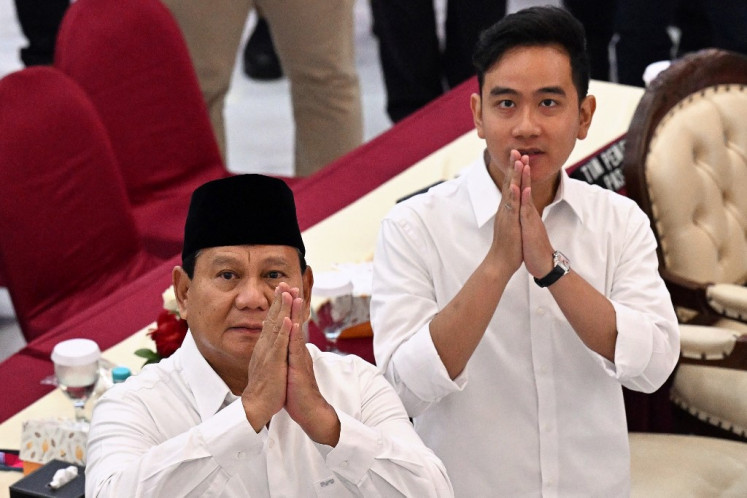Third spark in 58 years of Asia-Africa spirit
In Indonesia and Africa, the Asia-Africa conference holds a special place in history
Change Size

I
n Indonesia and Africa, the Asia-Africa conference holds a special place in history. It was a moment of great national pride, which has defined modern Indonesia to develop our nation state as an independent nation and engaging internationally on our terms.
The Asia Africa Conference in 1955 in Bandung was the first real spark of self awareness and collective pride among world's colonized countries. The first spark was political in nature, to gain political independence from colonialism and build new states.
The movement was created to support each other in this process and fight for each other's behalf. The Non Aligned Movement for South-South Cooperation was intended to help the colonized world became independent and to help develop our nation states.
In 1995 Indonesia created the NAM Center for South-South Cooperation and thus the beginning of South-South cooperation, could be said was founded through the Asia Africa Conference. This would be the second spark, whereby technical assistance especially relating to rural development experiences is being conducted among Asia-African countries themselves. Indonesia has hosted thousands of African farmers for training of specific agricultural techniques for years.
Fast forward 58 years later, we have shown resilience through challenging times. Our economies have weathered the recent global and financial crisis well. In the most recent IMF Economic Outlook, out of the 20 highest growth countries 11 were from Sub Saharan and North Africa, one from Middle East and eight from Asia. This has been due to sound macro basis and fiscal space to undertake stimulus, and increased south-south trade as source of growth as well as switching to domestic and regional sources of growth.
African nations are now also experiencing more stability, an ongoing process of democratization and reforms, and are opening up to more trade, including with each other. Africa now trades 50 percent with developing countries and reduced its share with West Europe from 51 percent to 28 percent. Out of the 50 percent of trade 30 percent is with Asia and 10 percent is intra African trade.
African countries have shown resilience through the crisis and some have also succeeded in reducing poverty and have sustainable programs to address MDG goals. Although challenges remain, there is optimism and high hope. The Economist's article on Africa Rising earlier this year captures this image.
The challenge is how to attract investment and increased exports, and not just primary products but increased processed products and manufactures.
The new Asia Africa spirit should be revitalized in economic terms. In facing the slowdown of the world economy, we need to ensure increased investment and trade flows in a mutually beneficial way. South-South Cooperation can make the system better in terms of trade and investment flows and capacity building. The reduction of economic dependence on certain markets and certain products, and increased South-South cooperation will also benefit global trade.
Trade as an engine of growth should be done under the WTO framework and the importance of a single, global, rules based and fair trading system that is the most fair for developing, least developed and poor countries.
This means a few things.
First, facilitating the accession of the remaining 11 out of the 53 countries in Africa who have not yet
acceded to the WTO to accede.
Second, to ensure the conclusion of the Doha Round and ensuring the trade and development agenda remains central in negotiations. This includes the removal of trade distorting policies in agriculture and that defensive interests of poor farmers are safeguarded. It is also key to ensure that negotiations and implementation of agreements reflect simple, effective and operational special and differential treatment, as well as effective aid for trade so that the benefits of trade can accrue to all.
Third, to ensure that trade is a means to development, complementary policies will be needed. These include investment in infrastructure, ensuring the capacity to produce and diversity exports from primary products, reaching production with economies of scale, upgrading and training of human capital and ensuring transfer of technology. That is physical and soft infrastructure is critical to get product and services to market.
Fourth, the so called 'early harvest' in the WTO negotiations currently being discussed includes trade facilitation, which focuses on ensuring goods will flow faster and more effectively crossing borders. To ensure that the agreement can be implemented and benefit developing and least developing countries, there needs to be effective aid for trade on trade facilitation.
Fifth, enhancing African Economic Integration 2017-2025 under a WTO framework. WTO should collaborate with African countries and regional groups. And such collaboration with African countries alongside development partners need to ensure that trade can be transformative to Africa, drawing relevant experience such as in Asia.
While multilateral trading system is working on those elements, we could also in parallel develop the third spark of Asia-Africa Spirit, namely inter-regional trade and investment activities between Asia and Africa. Indonesia could lead to an even more robust, wider and deeper trade and investment alliance between Asia and Africa.
On the 58th Anniversary of Asia-Africa Conference, let us keep the Bandung spirit and take it to the next level of cooperation that will bring more jobs, prosperity and standard of living of Asia-Africa through common vision, perceptions and actions.
Havas Oegroseno is Ambassador of Republic of Indonesia, Brussels and Mari Pangestu is Tourism and Creative Economy Minister. All views are personal views of the writers and were conceived in reflecting on the 58th anniversary of the Asia-Africa Conference and views expressed at the Crans Montana Forum on Africa and South-South Cooperation, Brussels March 2013.









